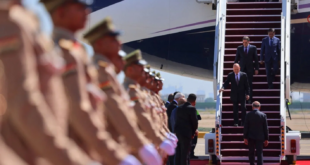China’s growing military prowess and increasingly aggressive foreign policy have revived talk among U.S. and European officials of creating an “Asian NATO” of regional powers to contain communist Beijing’s expansionist ambitions.
Past efforts for an East Asian security alliance, such as the post-World War II Southeast Asia Treaty Organization (SEATO) to guard against Cold War-era communism, failed to gain lasting traction.
But that was before China’s emergence as a rising superpower — a reality NATO Secretary-General Jens Stoltenberg has said is “fundamentally shifting the global balance of power” in ways should motivate NATO itself to “become more global.”
Quietly, Trump administration officials have gone further. Deputy Secretary of State Stephen E. Biegun recently suggested that the informal defense alignment between the U.S., Japan, Australia and India already known as the Quad could be the beginning of a NATO-style alliance in Asia.
“It’s something that I think in the second term of the Trump administration or, were the president not to win, the first term of the next president, it could be something that would be very much worthwhile to be explored,” Mr. Biegun said at a U.S.-India strategic dialogue on Aug. 31.
Senior officials from the four powers — all of which had tense recent relations with China — held another virtual meeting on Friday, Indian newspapers reported. The Indian Ministry of External Affairs said the four countries called for a “free, open, prosperous and inclusive” Indo-Pacific region based on shared valued and respect for international law.
Mr. Biegun said last month that the Asian NATO would be about more than simply countering China, and could focus on broadly coordinating militaries and economies of the region’s smaller nations around a rules-based value system.
“It is a reality that the Indo-Pacific region is actually lacking in strong multilateral structures. They don’t have anything of the fortitude of NATO or the European Union. The strongest institutions in Asia oftentimes are not inclusive enough,” Mr. Biegun said. “There is certainly an invitation there at some point to formalize a structure like this.”
The comments quickly spurred debate among proposed alliance members. Some argue the Quad — a strategic forum first initiated back in 2007 by then-Japanese Prime Minister Shinzo Abe and later embraced by the Trump administration as part of its 2017 Indo-Pacific strategy — is ripe for expansion given China’s recent troubling behavior.
The catch is that the Quad, while stepping up joint military exercises in recent years, has struggled since its inception by the hesitation of some members that a more formal Asian NATO would anger China and result in a punitive economic backlash from Beijing. But as China’s military and economic muscle expand, that fear may be fading.
“One country or another at one time or another has been worried about antagonizing China,” said Michael Kugelman, deputy director of the Asia program at the Wilson Center.
“But things are different now,” he added. “The Quad really has legs at this point and I think that’s because there’s a growing consensus among the Quad countries, as well as other nations in the region, that China’s activities there are not only aggressive, but increasingly threatening to global stability.”
Apart from the construction of military bases on artificial islands in disputed areas of the South China Sea, Beijing’s use of so-called “Wolf Warrior” diplomacy in recent years has angered and unnerved its neighbors, Mr. Kugelman argued. The practice, which got its name from the Rambo-style Chinese-action movie “Wolf Warrior,” often sees Chinese officials in Australia, India and Japan sharply denouncing officials and institutions in those nations who criticize China.
Dramatic departure
It’s been a dramatic departure from the past when Beijing kept a low diplomatic profile sought to avoid confrontation internationally.
“This use of ‘Wolf Warrior’ diplomacy has been a trigger for new momentum behind the Quad,” said Mr. Kugelman, although he cautioned that Washington is still likely to encounter challenges trying to build a full-fledged NATO collective security alliance. That’s true even though India, a key target of the alliance idea, came close to a shooting war with China in a border clash earlier this year that has still not been resolved.
New Delhi traditionally has resisted participating in such formal alliances, even with powerful and like-minded democracies such as the United States. “The U.S. and India have a strong security partnership, but the Indians continue to want to play this role of the strategic independent actor,” said Mr. Kugelman.
Daniel S. Markey, a former State Department official now at Johns Hopkins University’s School of Advanced International Studies, said in an interview that while India may be “eager to work to push back against China,” it seeks to do so “only on its own terms.”
“U.S. policymakers are now well-aware that the ‘ally’ language doesn’t get a good reception in New Delhi, so turning the Quad into a new NATO-like institution is, at least for the near future, a nonstarter,” said Mr. Markey, although he acknowledged that recent Chinese actions internationally could create an opening for Washington.
The clash in the Himalayas, China’s expansive sovereignty claims in the South China Sea, and the crackdown on pro-democracy protesters in Hong Kong “may be shifting attitudes in India” in a manner that “makes the American job of convincing Indians that China is a threat easier.”
The Indian Embassy in Washington, D.C., did not respond to a request for comment. However, one Indo-Pacific source familiar with India’s position told The Washington Times on condition of anonymity that China’s Himalayan aggression — as well as U.S. offers to help India respond to it — have given New Delhi renewed incentive to coordinate with the Quad.
But the source stressed that India remains staunchly against formal participation in any security alliance that’s focused on countering China militarily. “To talk about an Asian NATO is definitely jumping the gun,” the source said, “because it puts out a narrative of a military grouping, which Delhi is against.”
India in 2017 even agreed to join the Shanghai Cooperations Organization (SCO), a loose confederation that China has pushed as an alternative security alliance to coordinate military and anti-terrorism policies in Asia.
China itself has sent conflicting signals about the fear that the U.S. and its main Asian allies are moving toward a more formal alliance to contain Beijing’s rise, according to a survey by Joel Wuthnow, a senior research fellow in the Center for the Study of Chinese Military Affairs at National Defense University in the journal Strategic Forum.
Chinese Foreign Minister Wang Yi in March 2018 compared reports that the Quad was attempting to “contain” China to “sea foam in the Pacific or Indian oceans” that would soon wash away because “stoking a new Cold War is out of sync with the times and inciting bloc confrontation will find no market.”
But other Chinese strategists take it as a matter of course that U.S. “Indo-Pacific” policy is aimed first and foremost at preventing China from challenging the U.S. as a global superpower.
“Chinese interpretations of U.S. strategy in Asia as a containment plot are deeply rooted and have persisted across recent U.S. strategic adjustments, including the rebalance to Asia,” Mr. Wuthnow wrote.
‘America First’
Some remain skeptical that the Trump administration is serious about promoting the sort of multilateralism that an expanded Quad effort may entail, noting Mr. Trump’s own touchy relations with the original NATO and his complaints the European allies have failed to pay their fair share of the collective defense costs.
As part of its “America First” foreign policy, the administration has put particular pressure on South Korea, a potential player in an expanded Quad, as well as Japan, two nations that collectively house more than 80,000 U.S. troops.
“I see the Trump brand of ‘America First’ as toxic to advancing serious cooperation,” said Patrick Cronin, the Asia-Pacific security chair at the Hudson Institute in Washington, who says a more modest approach might be best.
“Bulking up” the Quad by “adding coalition partners for specific tasks, such as maritime situational awareness or cybersecurity, seems like a logical next step to advance cooperation without expecting the impossible,” Mr. Cronin said. “This is also something that could be sustained in a Biden administration.”
David Maxwell, a retired U.S. Special Forces Colonel and East Asia expert with the Foundation for Defense of Democracies, said China’s “aggressive behavior” may be fueling talk of an Asian NATO but U.S. policy under Mr. Trump is undercutting the momentum.
“The U.S. is behind the eight ball so to speak and I fear we will squander an opportunity,” said Mr. Maxwell. Despite Mr. Biegun’s recent comments, the Trump administration’s “shift from an interest-, values- and strategy-based alliance philosophy to a transactional foundation undermines U.S. credibility.”
“The time is ripe,” Mr. Maxwell said, “[but] we may have missed the opportunity because of the current alliance and economic world views of the administration.”
Short of an Asia NATO, some have talked of a so-called “Quad Plus” grouping of nations, anchored around non-military initiatives such as infrastructure financing support from the U.S., Japan, Australia and others with the goal of countering China’s vastly ambitious “Belt and Road “overseas investment program under President Xi Jinping.
Mr. Maxwell pointed to the establishment of the so-called “Blue Dot Network,” which the U.S., Japan and Australia announced last year, aimed at assessing and certifying infrastructure development projects in Indo-Pacific and beyond. The newly created Economic Prosperity Network, which the Trump administration has pushed in the wake of the COVID-19 pandemic to reduce global supply chain reliance on China, may also be a foundation for expanding the Quad along non-military lines.
“Paradoxically,” Mr. Maxwell said, the pursuit of a Quad Plus paradigm through such initiatives “might provide a foundation for a Biden foreign policy structure in Asia should he be elected.”
“If Trump is reelected, I hope his national security team can convince him to drop his transactional alliance philosophy, because there is a great opportunity to invest in security and economic prosperity in Asia given Chinese actions,” he said.
Mr. Kugelman said that “the big question is: How do you put more meat on the bones of the Quad” in a way that can draw in smaller nations, particularly in Southeast Asia?
“Southeast Asian countries are in a tough spot right now because, despite their fears of Chinese dominance, they still want to be able to look to Beijing for economic support, particularly with regard to infrastructure, while at the same time depending on the security umbrella of the United States,” Mr. Kugelman said.
“If the U.S. gets its act together and is able to step things up as a big player in the infrastructure game, nations in the region might be more willing to enter into something like an expanded Quad.”
 Eurasia Press & News
Eurasia Press & News



